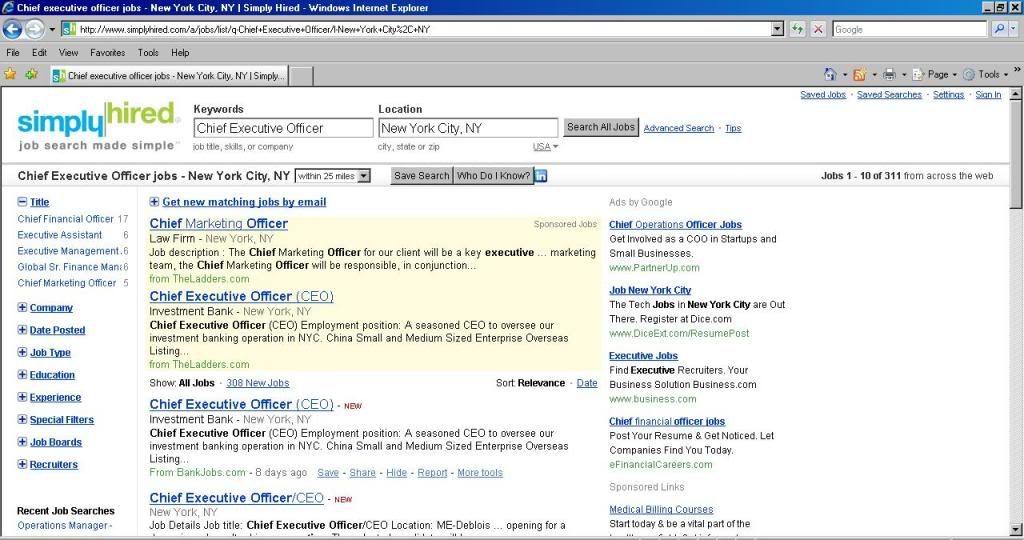
Regardless of the amount of education, experience or creative vision you think you can bring to that new
job you’re going to apply for, none of it will get you in the door if your
resume has all the earmarks of an amateur.
Adherence to the following six tips will ensure that you are putting your best foot forward and projecting a winning image that will get your bio and credits favorably noticed by those who are in a position to say “yes” to your
career advancement.
BREVITY A well done
resume should not exceed one page in length. If it runs more than a page, you are either rambling or engaging in overkill to sell your talents. A rambling
resume suggests to the reader that you don’t know how to pull your thoughts together and that you require a lot of words and time to get your point across. One that reiterates material which has already been set forth and/or includes copious attachments which were not requested has the effect of making a reader think that you are blowing smoke to pad out a spotty employment record, mask your deficiencies, or that you are just really desperate.
A hiring authority should be able to see at a quick glance what positions you have held and what types of skills you can bring to the table. It should also be remembered that today’s competitive
job market means that an HR department will be inundated with dozens, hundreds, or even thousands of
resumes that need to be read, sorted, and whittled down to a manageable number of semi-finalists who can advance to the next level. If your submission reads more like a chatty Christmas newsletter than a succinct summary of your accomplishments, it is guaranteed not to make the first cut.
RESULTS Anyone can say that he or she has held a
job as a salesperson, a machinist, or an executive assistant. What a prospective employer looks for, however, is whether the candidate did more than just take up space and draw a weekly paycheck for it. Did your salesmanship skills consistently top the quarterly expectations for your division? Did you invent a device that made an existing piece of equipment operate more efficiently? Did your powers of persuasion convince Sting to make a personal appearance at your company’s ribbon cutting ceremony? A results oriented
resume will put you ahead of the competition because it conveys more than just a litany of tasks; it demonstrates a sense of initiative to improve upon the status quo and a commitment to giving 110% as a team player with the company’s best interests at heart.
Don’t forget that volunteer and community service activities are pertinent to list on your resume as well, especially if your efforts were instrumental in raising funds, passing an initiative, saving an historic landmark, teaching at-risk kids to read, etc.
RELEVANCE Yes, it’s fascinating that you took a year off after college to meditate with monks in Tibet but what, exactly, does it have to do with being a hostess at a steakhouse? While one’s life experiences are certainly contributing factors to a
job seeker’s work ethic and sense of self, your future employer’s bottom line will always get back to, “That’s nice but what does all of this mean to me?”
To that end, savvy
job applicants don’t limit themselves to just one all-purpose
resume but, rather, several which respectively emphasize those details that have the most direct bearing on the positions they are seeking. For instance, let’s say that you have experience as a freelance writer, an accountant and a graphic designer. The
job you are applying for is in the accounting office. Thus, the accounting background will be the one rotated into the most prominent slot. Seasoned interviewees also know to incorporate buzz words in their resume that subtly mirror the specifications of a particular job and, accordingly, create a sense of familiarity to which an employer will easily gravitate.
 Click here to go to Page 2
Click here to go to Page 2
 Faced with a brutal job market and a staggeringly high unemployment rate, some college and grad school graduates are taking matters into their own hands and turning to entrepreneurship.
Faced with a brutal job market and a staggeringly high unemployment rate, some college and grad school graduates are taking matters into their own hands and turning to entrepreneurship.  Click here to go to Page 2
Click here to go to Page 2
 Classifieds are an excellent resource when it comes to finding jobs – for this reason alone: employers that post in the classifieds are sure to be looking. However, it is also because of this fact and the wide availability of most classifieds (including online and newspapers) that there is bound to be a lot of competition when it comes to applying for jobs advertised in classifieds.
Classifieds are an excellent resource when it comes to finding jobs – for this reason alone: employers that post in the classifieds are sure to be looking. However, it is also because of this fact and the wide availability of most classifieds (including online and newspapers) that there is bound to be a lot of competition when it comes to applying for jobs advertised in classifieds.  Regardless of the amount of education, experience or creative vision you think you can bring to that new job you’re going to apply for, none of it will get you in the door if your resume has all the earmarks of an amateur.
Regardless of the amount of education, experience or creative vision you think you can bring to that new job you’re going to apply for, none of it will get you in the door if your resume has all the earmarks of an amateur.  Today it seems we’re all “networking” all the time. Whether you’re on LinkedIn, Facebook, MySpace, Twitter, or another social networking site, you’ve entered your identity into an online forum because you hope to connect with other human beings. These sites can be fantastic ways to renew friendships, build business, find jobs after graduation, further your career, or espouse your point of view, but having a login to any of these accounts does not make you successful at networking.
Today it seems we’re all “networking” all the time. Whether you’re on LinkedIn, Facebook, MySpace, Twitter, or another social networking site, you’ve entered your identity into an online forum because you hope to connect with other human beings. These sites can be fantastic ways to renew friendships, build business, find jobs after graduation, further your career, or espouse your point of view, but having a login to any of these accounts does not make you successful at networking.  Job boards are in a predicament — evolve to stay useful and relevant, or jobseekers will set their sights elsewhere.
Job boards are in a predicament — evolve to stay useful and relevant, or jobseekers will set their sights elsewhere.